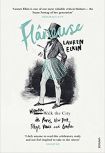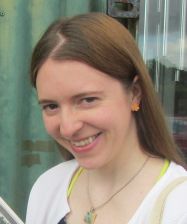Flaneuse: Women Walk the City in Paris, New York, Tokyo, Venice and London by Lauren Elkin
| Flaneuse: Women Walk the City in Paris, New York, Tokyo, Venice and London by Lauren Elkin | |
|
| |
| Category: History | |
| Reviewer: Rebecca Foster | |
| Summary: Raised in New York and now a Paris resident for more than a dozen years, Lauren Elkin has always felt at home in cities. Here she traces how women writers and artists have made some of the world's great cities their own, blending memoir, social history and literary criticism to form a unique and largely enjoyable book. | |
| Buy? Maybe | Borrow? Yes |
| Pages: 336 | Date: July 2017 |
| Publisher: Vintage | |
| External links: Author's website | |
| ISBN: 9780099593379 | |
| Video:
| |
Lauren Elkin is down on suburbs: they're places where you can't or shouldn't be seen walking; places where, in fiction, women who transgress boundaries are punished (thinking of everything from Madame Bovary to Revolutionary Road). When she imagines to herself what the female version of that well-known historical figure, the carefree flâneur, might be, she thinks about women who freely wandered the world's great cities without having the more insalubrious connotation of the word 'streetwalker' applied to them.
Back in the 1840s, a flâneur was of necessity a man – 'As if,' Elkin jokes, 'a penis were a requisite walking appendage, like a cane.' The object of this wide-ranging, erudite book, then, is to tell the forgotten history of those female artists and writers – the flâneuses – who paved the way so that future generations of women could walk around freely in pursuit of their creative professions.
In most chapters, Elkin chooses a patron(ess) saint, discussing her life and work and how the two were intertwined. For instance, the first chapter on Paris is mostly about Jean Rhys, whose sad, wandering female characters take on some of the unhappiness of their creator's life. The London chapter, likewise, is mostly about Virginia Woolf, who, like her heroine Mrs Dalloway, was a typical flâneuse. Other sections focus on George Sand, the artist Sophie Calle, the filmmaker Agnès Varda, and war correspondent/novelist (and Hemingway wife) Martha Gellhorn, city walkers all. In Sand's case, it was not just moving from the countryside to the city but also wearing men's clothing that gave her the freedom she sought.
Throughout, Elkin weaves in fragments of her own history. Her life has pivoted around two of the book's model cities: she attended university in New York, the city in whose environs she was raised, and studied abroad in Paris, which she later chose to make home. She is able to spot the ways in which she's come full circle: she had a doomed relationship with a fellow student from New York during her year abroad, and ten years later she found herself teaching the works of Rhys – an expert at heartbreak – on that very same study abroad programme. Elsewhere she recalls researching a novel set in Venice when she should have been writing her PhD, and a lonely time spent in Tokyo, where she'd followed a boyfriend.
In a neat example of form flowing from content, this book meanders from city to city and figure to figure, sometimes seeming more random than is necessary. My interest waned during a couple of later chapters on protesting ('taking to the streets') and the films of Agnès Varda. I wasn't always convinced by the connections the author draws; I might have been just as happy reading a work of pure memoir with the occasional literary point of reference. However, especially when she's musing on Gellhorn's rootlessness, Elkin captures the angst of being a woman caught between places and purposes in a way that expatriates like myself will appreciate:
'We may keep the home fire burning, or we may burn the house down; we may stay home, burning inwardly, or we may take off in a conflagration of self-assertion. We watch the fires of destruction, of desire, and of ambition, and wonder what we can risk, and what we might gain.'
'All of human history is a story of migrations and conquests. All of us are exiles, but some of us are more aware of it than others.'
It's in making the history of the flâneuse personal that Elkin opens her book up to a wider swathe of readers than just the feminist social historians and literary critics who might seem like her natural audience. I would particularly recommend this to readers of Rebecca Solnit and Olivia Laing.
Further reading suggestion: The Trip to Echo Spring: Why Writers Drink by Olivia Laing and Women of the Revolution: Forty Years of Feminism by Kira Cochrane (editor).
Please share on: ![]() Facebook,
Facebook, ![]() Twitter and
Twitter and
![]() Instagram
Instagram
![]() You can read more book reviews or buy Flaneuse: Women Walk the City in Paris, New York, Tokyo, Venice and London by Lauren Elkin at Amazon.co.uk Amazon currently charges £2.99 for standard delivery for orders under £20, over which delivery is free.
You can read more book reviews or buy Flaneuse: Women Walk the City in Paris, New York, Tokyo, Venice and London by Lauren Elkin at Amazon.co.uk Amazon currently charges £2.99 for standard delivery for orders under £20, over which delivery is free.
![]() You can read more book reviews or buy Flaneuse: Women Walk the City in Paris, New York, Tokyo, Venice and London by Lauren Elkin at Amazon.com.
You can read more book reviews or buy Flaneuse: Women Walk the City in Paris, New York, Tokyo, Venice and London by Lauren Elkin at Amazon.com.
Comments
Like to comment on this review?
Just send us an email and we'll put the best up on the site.


